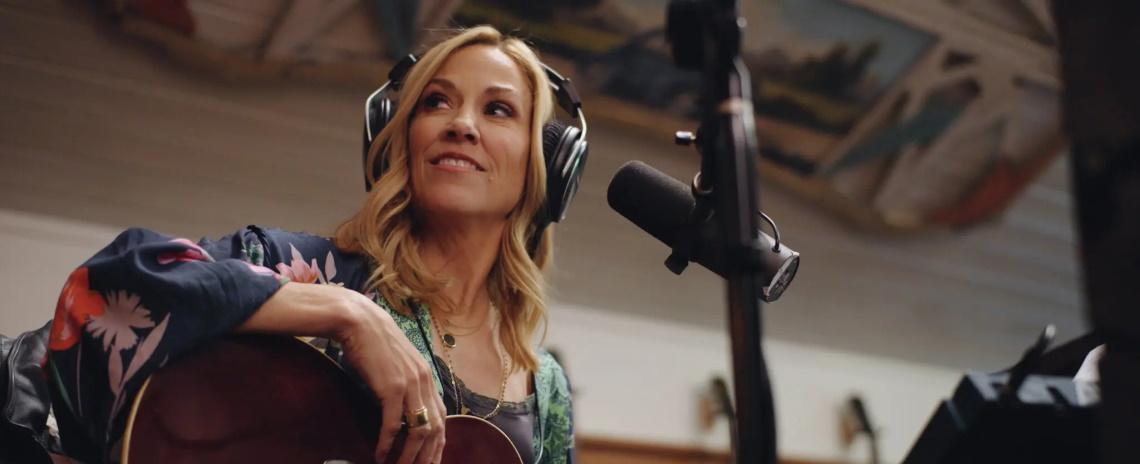For celebrities who rose to fame in the digital age, it’s difficult to imagine a reality in which fans don’t know everything about their personal life, their big break, the highs and lows of their career, or the friends and enemies they made along the way. Take Sheryl Crow, for example: Born and raised in Kennett, Mo., a mid-sized city in the state’s Bootheel, the highly decorated singer-songwriter achieved international success just as the Internet was becoming commercialized. With tabloids going virtual and recording equipment becoming both affordable and portable, Crow’s rise was documented, publicized, and trivialized by journalists, paparazzi, and fans alike. How could there be a single new thing to learn about a household name like hers? As it turns out, documentarian Amy Scott understands how to create something revealing from familiar history: Place the celebrity at the center of their story and allow them the opportunity to reclaim it.
Scott’s documentary Sheryl plays things straight, starting at the beginning of Crow’s music career and ending with a look toward the future. To its benefit, it forgoes any narrative complications and keeps the sequence of events more or less chronological. (Excluding the occasional glimpse of Crow doing sound checks in the present day while discussing an event from decades earlier.) For those who were alive during her ascent to pop-rock stardom, the major blips on the film’s timeline will likely ring a bell. However, for a new generation of fans who have started to delve into her eclectic catalog in recent years, the film’s rundown of her very public life from the mid-’90s to the mid-’00s may feel like entirely new information. Regardless of one’s prior knowledge of Crow, hers is still a story well worth telling and retelling.
Director Scott uses just about every trick in the book for Sheryl. If there’s a documentary trope one can think of, there’s a decent chance it shows up here: famous figures giving talking-head interviews, staged reenactments placed over narration, an endless supply of archival footage from throughout Crow’s life, and so forth. An over-reliance on any one of these devices can come off as feeling uninspired or lazy, but Scott’s strategy of throwing everything at the wall and seeing what sticks works surprisingly well. Whether due to the comfort of its traditional form or the sheer power of Crow’s story (or maybe both), Scott’s sophomore effort allows her subject to shine without any flashy stylistic choices getting in the way. In light of her feature debut, Hal (2018) — a similarly structured portrait of New Hollywood icon Hal Ashby — and her previous work as creative director for MasterClass, it seems this kind of coverage is something audiences should expect from Scott.
Of all the interviewees — ranging from Crow’s former roommate Laura Dern to fellow musicians and friends Brandi Carlile, Emmylou Harris, and Jason Isbell to important figures from inside her camp such as Scooter Weintraub and Trina Shoemaker — the most insightful is Crow herself. It’s not uncommon these days for the subject of a documentary to also be involved behind the scenes. Sheryl goes beyond merely granting its eponymous star an executive-producer credit, however: Crow is the very core of the film, telling her own story in her own words with an openness and an honesty that prove to be incredibly incisive. Even with Crow’s direct involvement, Sheryl hardly shies away from the more controversial areas of her rise to stardom. She proves very game, and that keeps Sheryl from encroaching into puff-piece territory.
With so many other documentaries that track the journey of a well-known public figure, what is it about Sheryl that makes it a standout? The answer lies in Scott’s prioritization of her subject, the accentuation of Crow’s own account over the one that has served as public record for 20-plus years. Whether it’s her star-making tour with Michael Jackson, her award-winning debut album, the fallout of the “Leaving Las Vegas” incident, Sheryl grants Crow the ability to set the story straight and take back her history. Is it possible that some of the headlines were true, that Crow might have missed a detail or two, that the real truth might be more complicated? Of course. However, revelations contained in Scott’s documentary suggest the singer is trying her best to remain forthright, even when it doesn’t put her in the best light. This unpretentious vulnerability is what ultimately makes Crow’s version worth trusting.
Today, with more attention being paid to the misconduct that has become commonplace in institutions of enormous authority, it’s not shocking to hear of the chicanery Crow has experienced in the music industry. Her voice joins a chorus of other women — such as Taylor Swift, Megan Thee Stallion, and Kesha — who have dealt with nefarious actors in the upper echelons of the business. However, her story is no less mighty despite the existence of other artists with similar complaints. In fact, quite the opposite: Sheryl demonstrates that there’s power in creating a united front against these oppressive forces, a resilience to be found in sharing what one has been through, and a strength to be derived from empathizing with others that the machine attempted to chew up and spit out. Of all the positives that Sheryl has going for it, this is undoubtedly the most significant.
Rating: B
Sheryl is now available to stream from Showtime.


